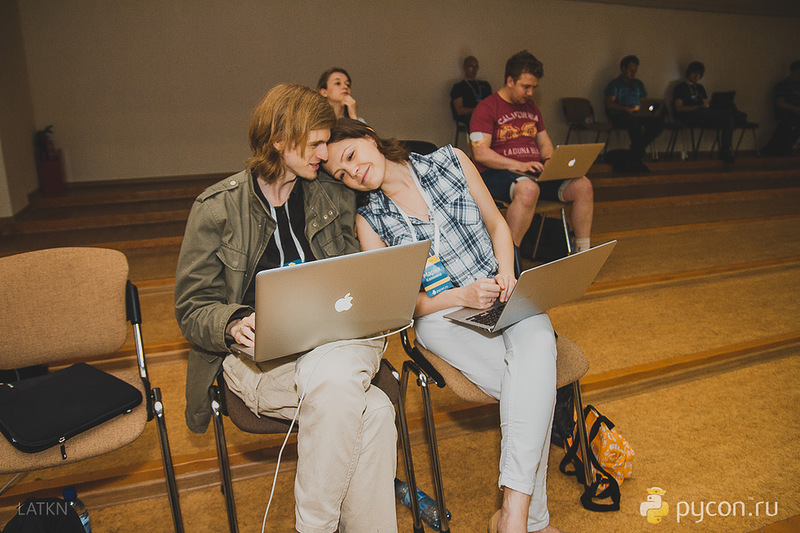PyConRu: why?
Hello!
20 reports, 2 workshops, Lightning Talks, discussion panel, Unconference, afterparty with bonfire and songs, the beautiful country hotel “Cronwell Yakhonty Tarusa” is all about the PyCon Russia conference, which will be held on July 3-4, 95 km from Moscow.
Below is a description of the reports and workshops, and also the answer to the question of why PyCon should go with the whole family.
')
Since June 13, the ticket price rises. It's time to look at the program again and register if you put it off.

We discuss the details of the latest reports, but the main part of the program is ready.
A portion of the reports that appeared recently.
 Armin Ronacher (Vienna, Austria), author of the Flask framework, the Pallets project, one of the founders of the Pocoo Team, the author of the well-known Python Jinja2 templating engine and several open source libraries, a Sentry partner and a consultant for Fireteam, will plunge into the inside of the CPython interpreter with the report How Python was Shaped by leaky internals.
Armin Ronacher (Vienna, Austria), author of the Flask framework, the Pallets project, one of the founders of the Pocoo Team, the author of the well-known Python Jinja2 templating engine and several open source libraries, a Sentry partner and a consultant for Fireteam, will plunge into the inside of the CPython interpreter with the report How Python was Shaped by leaky internals.
 Andrei Svetlov , Python Core Developer, program director of PyCon Russia, will tell you about the py.test library. The talk will cover writing pytest fixtures (the main extension tool), adding configuration parameters, writing plugins, and other useful things. Andrey is sure that this library is much more convenient for writing tests than the standard unittest. By the way, we recently had a short interview with Andrew about the python language and not only.
Andrei Svetlov , Python Core Developer, program director of PyCon Russia, will tell you about the py.test library. The talk will cover writing pytest fixtures (the main extension tool), adding configuration parameters, writing plugins, and other useful things. Andrey is sure that this library is much more convenient for writing tests than the standard unittest. By the way, we recently had a short interview with Andrew about the python language and not only.
 Everyone wants to know how their code is executed. Many people guess how this can be measured. And only a few find the strength to wade through the measurement results. Kirill Borisov , developer of authorization systems from Yandex (Moscow), in the report will try to simplify all this with the help of visualization - namely, flame graphs, beautiful and visual. Kirill will also, together with the participants, review the data collection process, their preparation and teach you how to read the resulting graphs with examples.
Everyone wants to know how their code is executed. Many people guess how this can be measured. And only a few find the strength to wade through the measurement results. Kirill Borisov , developer of authorization systems from Yandex (Moscow), in the report will try to simplify all this with the help of visualization - namely, flame graphs, beautiful and visual. Kirill will also, together with the participants, review the data collection process, their preparation and teach you how to read the resulting graphs with examples.
 Developer from Endpoint.com (involved in distributed systems of visualization of geodata, 3D models and Street View panoramas) Dmitry Kiselev (Yekaterinburg) will tell you what makes the Robot Operation System interesting, why you should use it instead of the Middleware framework, and explain in detail why you need a Robot Operation System , even if you are not a robot.
Developer from Endpoint.com (involved in distributed systems of visualization of geodata, 3D models and Street View panoramas) Dmitry Kiselev (Yekaterinburg) will tell you what makes the Robot Operation System interesting, why you should use it instead of the Middleware framework, and explain in detail why you need a Robot Operation System , even if you are not a robot.
 Konstantin Lopukhin , a developer at Scrapinghub (Moscow), will give a talk for those who need to give users the opportunity to expand the application using scripts or macros. When it becomes clear that this is necessary, many problems immediately arise. Embed someone else's language, or make your own? If someone else, how to organize a sandbox, which will not allow to execute arbitrary code? How to arrange an API and select the desired level of abstraction? How to show the user errors, how to better organize the documentation, how to train new users? When is this generally justified?
Konstantin Lopukhin , a developer at Scrapinghub (Moscow), will give a talk for those who need to give users the opportunity to expand the application using scripts or macros. When it becomes clear that this is necessary, many problems immediately arise. Embed someone else's language, or make your own? If someone else, how to organize a sandbox, which will not allow to execute arbitrary code? How to arrange an API and select the desired level of abstraction? How to show the user errors, how to better organize the documentation, how to train new users? When is this generally justified?
Please note these reports will be in English.
 Raymond Hettinger (Santa Clara, USA), Python core developer since 2001, the author and maintainer of many parts of the language, will give a talk on "Static Type Checking in Python:
Raymond Hettinger (Santa Clara, USA), Python core developer since 2001, the author and maintainer of many parts of the language, will give a talk on "Static Type Checking in Python:
Last year, the Python Software Foundation awarded it the Python Distinguished Service Award for exceptional contributions to the development of the Python community. Thanks to this person, generator expressions, local optimization, collections and the itertools module, LRU caching and some of the built-in functions that we use every day, for example, any, all, enumerate, reversed, zip and sorted are as they are. Cook the questions!
 Nathaniel Manista (San Francisco, USA), programmer for Google projects such as Project Hosting At code.google.com , Google Summer of Code and gRPC , PyCon US frequenter, best practicing master of reports, tells you about best practices for supporting large software projects in the report "Code Unto Others". How to design, write and maintain large applications so that edits in one place do not break everything else.
Nathaniel Manista (San Francisco, USA), programmer for Google projects such as Project Hosting At code.google.com , Google Summer of Code and gRPC , PyCon US frequenter, best practicing master of reports, tells you about best practices for supporting large software projects in the report "Code Unto Others". How to design, write and maintain large applications so that edits in one place do not break everything else.
 Martin Gorner (France), Developer Relations from Google , will talk about Tensorflow , a fundamentally new, fast, smart and flexible machine learning system from Google that can work on a simple smartphone as well as on thousands of nodes in data centers.
Martin Gorner (France), Developer Relations from Google , will talk about Tensorflow , a fundamentally new, fast, smart and flexible machine learning system from Google that can work on a simple smartphone as well as on thousands of nodes in data centers.
In addition, Martin will hold a workshop for those who want to get deeper into Tensorflow.
 David MacIver (London, UK) - the author of Hypothesis - a library for easy and smart testing for python, previously worked in Google and several London startups, will talk about the problems of good testing in the report "21st Century Software Testing" and teach you how to use your library at a workshop "Property-based testing with Hypothesis".
David MacIver (London, UK) - the author of Hypothesis - a library for easy and smart testing for python, previously worked in Google and several London startups, will talk about the problems of good testing in the report "21st Century Software Testing" and teach you how to use your library at a workshop "Property-based testing with Hypothesis".
 Do you want to attract contributors to your project and make it successful? The report of Jackie Kazil from Washington will be just for you. Technical Fellow at Capital One , an active member of the PyLadiesDC, PyLadies Int'l, Women Data Science DC, Python Software Foundation, author of the book Data Wrangling with Python and the Mesa Library, Jackie tells you about techniques and design methods that will help inspire developers to more active participation in your project.
Do you want to attract contributors to your project and make it successful? The report of Jackie Kazil from Washington will be just for you. Technical Fellow at Capital One , an active member of the PyLadiesDC, PyLadies Int'l, Women Data Science DC, Python Software Foundation, author of the book Data Wrangling with Python and the Mesa Library, Jackie tells you about techniques and design methods that will help inspire developers to more active participation in your project.
 Alexander Koshkin , Senior python developer at Positive Technologies from Boston, will give a talk with the wonderful title “Know and love your CPython in the name of the moon and great justice”. Alexander will consider the blocks from which the interpreter is made, tell you how they interact, explain how they work at a low level and show what profit and problems can be obtained from this.
Alexander Koshkin , Senior python developer at Positive Technologies from Boston, will give a talk with the wonderful title “Know and love your CPython in the name of the moon and great justice”. Alexander will consider the blocks from which the interpreter is made, tell you how they interact, explain how they work at a low level and show what profit and problems can be obtained from this.
 Ekaterina Tuzova , PyCharm developer (St. Petersburg), lecturer and curator of student projects at CompSciCenter and at the Academic University, will show in the report the Theano basic principles and the common difficulties that the developer faces when starting to use the library for the first time. Ekaterina will also consider the features of a compiler that translates mathematical expressions written in Python into effective C code.
Ekaterina Tuzova , PyCharm developer (St. Petersburg), lecturer and curator of student projects at CompSciCenter and at the Academic University, will show in the report the Theano basic principles and the common difficulties that the developer faces when starting to use the library for the first time. Ekaterina will also consider the features of a compiler that translates mathematical expressions written in Python into effective C code.
 Python's lead development engineer at Rambler & Co, Pavel Petlinsky (Moscow), will give a talk for inquisitive and curious pythonists who want to figure out how everything works under the hood, and "where is she inside neon". Python "slows down"? We look, how the virtual machine is arranged. Python ate all your memory? We look at how memory management and the data structure in the standard library are arranged. GIL is evil. What happens if you disable it?
Python's lead development engineer at Rambler & Co, Pavel Petlinsky (Moscow), will give a talk for inquisitive and curious pythonists who want to figure out how everything works under the hood, and "where is she inside neon". Python "slows down"? We look, how the virtual machine is arranged. Python ate all your memory? We look at how memory management and the data structure in the standard library are arranged. GIL is evil. What happens if you disable it?
 Lead Developer / DevOps at Ostrovok.ru Anton Egorov (Moscow) will share experience and best practices of deploying a web application in Python using Docker technology. Anton will tell you how to build an image from scratch, and give step-by-step instructions that can be used as a template for your applications. A couple of dozen applications passed through Anton’s hands that needed to be verified, and each new application is a separate quest.
Lead Developer / DevOps at Ostrovok.ru Anton Egorov (Moscow) will share experience and best practices of deploying a web application in Python using Docker technology. Anton will tell you how to build an image from scratch, and give step-by-step instructions that can be used as a template for your applications. A couple of dozen applications passed through Anton’s hands that needed to be verified, and each new application is a separate quest.
 Senior python developer at Positive Technologies Artem Malyshev (Nizhny Novgorod) will talk about the internal structure of Celery and RQ. What problems did their creators face, how did they solve them and how do these solutions threaten the end user. How are groups, chords and eta arranged? How to achieve fault tolerance at the transport level? Why is it hard to scale?
Senior python developer at Positive Technologies Artem Malyshev (Nizhny Novgorod) will talk about the internal structure of Celery and RQ. What problems did their creators face, how did they solve them and how do these solutions threaten the end user. How are groups, chords and eta arranged? How to achieve fault tolerance at the transport level? Why is it hard to scale?
 Python occupies an integral place in the architecture of hh.ru - all frontend services and some backends are written on it. Timlid Team Products at HeadHunter , Python infrastructure maintainer hh.ru Andrey Sumin (Moscow) will talk about how Python copes with the workload of the most visited working site in runet (and why it sometimes doesn’t cope), solutions.
Python occupies an integral place in the architecture of hh.ru - all frontend services and some backends are written on it. Timlid Team Products at HeadHunter , Python infrastructure maintainer hh.ru Andrey Sumin (Moscow) will talk about how Python copes with the workload of the most visited working site in runet (and why it sometimes doesn’t cope), solutions.
 Senior Python developer at Positive Technologies Ivan Tsyganov (St. Petersburg) will explain why we need domain-specific languages (DSL), and what problems they help to solve. When it is worth developing your own language, and in which cases use an existing one? In addition, together with the participants, Ivan will come up with his DSL and compare various approaches to working with him in Python.
Senior Python developer at Positive Technologies Ivan Tsyganov (St. Petersburg) will explain why we need domain-specific languages (DSL), and what problems they help to solve. When it is worth developing your own language, and in which cases use an existing one? In addition, together with the participants, Ivan will come up with his DSL and compare various approaches to working with him in Python.
 Alexey Lavrenyuk (Moscow), Yandex developer, the author of the open-source project Yandex.Tank, who knows everything about load testing, tells about the stages of load testing and analyzing the results, the capabilities of the Yandex.Tank tool (which is written in python) and a little about its architecture , and how to write load scripts for Tank on python.
Alexey Lavrenyuk (Moscow), Yandex developer, the author of the open-source project Yandex.Tank, who knows everything about load testing, tells about the stages of load testing and analyzing the results, the capabilities of the Yandex.Tank tool (which is written in python) and a little about its architecture , and how to write load scripts for Tank on python.
 The topic of false positives is important for antivirus vendors. Favorite game or browser that is used on a daily basis after the update can start to “catch” antivirus. Popular anti-virus software affects millions of users. Python-developer in Scrapinghub, speaker PyCon-2015, Alexander Sibiryakov (Prague, Czech Republic) will tell how he built an automatic classifier of applications about false positives in Avast antivirus in order to relieve the virus lab from manual labor.
The topic of false positives is important for antivirus vendors. Favorite game or browser that is used on a daily basis after the update can start to “catch” antivirus. Popular anti-virus software affects millions of users. Python-developer in Scrapinghub, speaker PyCon-2015, Alexander Sibiryakov (Prague, Czech Republic) will tell how he built an automatic classifier of applications about false positives in Avast antivirus in order to relieve the virus lab from manual labor.
 Andrei Soldatenko (Kiev), CTO in Australian startup Persollo , python-developer at Toptal, speaker PyConRu-2015, will share his experience and tell how to build a large social graph for a social network using python and Graph.
Andrei Soldatenko (Kiev), CTO in Australian startup Persollo , python-developer at Toptal, speaker PyConRu-2015, will share his experience and tell how to build a large social graph for a social network using python and Graph.
Read full abstracts of all reports on the site .
Places in the main program have run out, but you can perform in a new format - Unconference. This is a mix of open microphone, round table, lightning talks, discussion and workshop. You need to declare at the Unconference in advance, but your application will be viewed not by the program committee, but by the PyConRu participants.
Applications are laid out in public access. Registered conference participants get online access to pre-voting for the stated topics. The topics that get the most votes will go to the Unconference program.
If you have a topic about which you want to talk, fill out the application .
A trip to PyCon can be not only a useful event for you, but also a great weekend for the whole family. Come with your loved ones - they will also have something to do while you are listening to the reports.
The hotel has a swimming pool, fitness center, billiards and even a 5D cinema. For children there is a playground, an amusement room and a trampoline. And you can ride horses, rent a bike, scooter, roller skates or fly a kite. Nearby there is a river with a beach (you can not swim there, but you can sunbathe). And all this against the background of the forest. Wow, isn't it?
A ticket for those traveling with you costs 5,000 rubles. It includes everything that a member's ticket, except for visiting reports.

The reports are the brain, and the afterparty is the soul of our conference. We advise you not to miss it.
Firstly, because absolutely all the participants of the conference will somehow be on it (unlike other conferences), and you will agree that it is not often possible to meet 300 pythonists in one place. Aftepati is the perfect place for sharing ideas, dating and holivar.
Secondly, all the speakers will also be after-party - you can ask them any questions, ask for advice or just talk “for life”.
Well, and thirdly, together with the sponsors, we will try to make you spend time not only useful, but also interesting. There will be desktops, “IT-hat” (yes, we will make our own version of the famous game), and, of course, a big pioneer bonfire.

For students, we have a special fixed price - 8000 rubles. To buy a ticket at a special price, send a student scan to om@it-people.ru, in response, we will send a promotional code.
Tell the students pythonists about this, suddenly, they do not know.
Sign up here . Now the ticket costs from 15 000 rubles. From June 13, the price rises.
The ticket price includes: two days of reports in two streams (at this point you need to look at the program again), accommodation in a standard double or triple room, meals, coffee breaks, participation in after-party, transfer in the morning of July 3rd from Art. m Annino to the venue and July 4th back.
And on July 5, we conduct free city tours for everyone.
Join now!
July 3-4, Cronwell Yahonty Tarusa, 95 km. from Moscow.

Thanks to our sponsors: General Sponsor - Positive Technologies , Gold Sponsor - JetBrains , Silver Sponsor - Rambler & Co , Bronze Sponsor - Ostrovok.ru .
20 reports, 2 workshops, Lightning Talks, discussion panel, Unconference, afterparty with bonfire and songs, the beautiful country hotel “Cronwell Yakhonty Tarusa” is all about the PyCon Russia conference, which will be held on July 3-4, 95 km from Moscow.
Below is a description of the reports and workshops, and also the answer to the question of why PyCon should go with the whole family.
')
Since June 13, the ticket price rises. It's time to look at the program again and register if you put it off.

We discuss the details of the latest reports, but the main part of the program is ready.
The freshest
A portion of the reports that appeared recently.
 Armin Ronacher (Vienna, Austria), author of the Flask framework, the Pallets project, one of the founders of the Pocoo Team, the author of the well-known Python Jinja2 templating engine and several open source libraries, a Sentry partner and a consultant for Fireteam, will plunge into the inside of the CPython interpreter with the report How Python was Shaped by leaky internals.
Armin Ronacher (Vienna, Austria), author of the Flask framework, the Pallets project, one of the founders of the Pocoo Team, the author of the well-known Python Jinja2 templating engine and several open source libraries, a Sentry partner and a consultant for Fireteam, will plunge into the inside of the CPython interpreter with the report How Python was Shaped by leaky internals. Andrei Svetlov , Python Core Developer, program director of PyCon Russia, will tell you about the py.test library. The talk will cover writing pytest fixtures (the main extension tool), adding configuration parameters, writing plugins, and other useful things. Andrey is sure that this library is much more convenient for writing tests than the standard unittest. By the way, we recently had a short interview with Andrew about the python language and not only.
Andrei Svetlov , Python Core Developer, program director of PyCon Russia, will tell you about the py.test library. The talk will cover writing pytest fixtures (the main extension tool), adding configuration parameters, writing plugins, and other useful things. Andrey is sure that this library is much more convenient for writing tests than the standard unittest. By the way, we recently had a short interview with Andrew about the python language and not only. Everyone wants to know how their code is executed. Many people guess how this can be measured. And only a few find the strength to wade through the measurement results. Kirill Borisov , developer of authorization systems from Yandex (Moscow), in the report will try to simplify all this with the help of visualization - namely, flame graphs, beautiful and visual. Kirill will also, together with the participants, review the data collection process, their preparation and teach you how to read the resulting graphs with examples.
Everyone wants to know how their code is executed. Many people guess how this can be measured. And only a few find the strength to wade through the measurement results. Kirill Borisov , developer of authorization systems from Yandex (Moscow), in the report will try to simplify all this with the help of visualization - namely, flame graphs, beautiful and visual. Kirill will also, together with the participants, review the data collection process, their preparation and teach you how to read the resulting graphs with examples. Developer from Endpoint.com (involved in distributed systems of visualization of geodata, 3D models and Street View panoramas) Dmitry Kiselev (Yekaterinburg) will tell you what makes the Robot Operation System interesting, why you should use it instead of the Middleware framework, and explain in detail why you need a Robot Operation System , even if you are not a robot.
Developer from Endpoint.com (involved in distributed systems of visualization of geodata, 3D models and Street View panoramas) Dmitry Kiselev (Yekaterinburg) will tell you what makes the Robot Operation System interesting, why you should use it instead of the Middleware framework, and explain in detail why you need a Robot Operation System , even if you are not a robot. Konstantin Lopukhin , a developer at Scrapinghub (Moscow), will give a talk for those who need to give users the opportunity to expand the application using scripts or macros. When it becomes clear that this is necessary, many problems immediately arise. Embed someone else's language, or make your own? If someone else, how to organize a sandbox, which will not allow to execute arbitrary code? How to arrange an API and select the desired level of abstraction? How to show the user errors, how to better organize the documentation, how to train new users? When is this generally justified?
Konstantin Lopukhin , a developer at Scrapinghub (Moscow), will give a talk for those who need to give users the opportunity to expand the application using scripts or macros. When it becomes clear that this is necessary, many problems immediately arise. Embed someone else's language, or make your own? If someone else, how to organize a sandbox, which will not allow to execute arbitrary code? How to arrange an API and select the desired level of abstraction? How to show the user errors, how to better organize the documentation, how to train new users? When is this generally justified?Foreign speakers
Please note these reports will be in English.
 Raymond Hettinger (Santa Clara, USA), Python core developer since 2001, the author and maintainer of many parts of the language, will give a talk on "Static Type Checking in Python:
Raymond Hettinger (Santa Clara, USA), Python core developer since 2001, the author and maintainer of many parts of the language, will give a talk on "Static Type Checking in Python:Last year, the Python Software Foundation awarded it the Python Distinguished Service Award for exceptional contributions to the development of the Python community. Thanks to this person, generator expressions, local optimization, collections and the itertools module, LRU caching and some of the built-in functions that we use every day, for example, any, all, enumerate, reversed, zip and sorted are as they are. Cook the questions!
 Nathaniel Manista (San Francisco, USA), programmer for Google projects such as Project Hosting At code.google.com , Google Summer of Code and gRPC , PyCon US frequenter, best practicing master of reports, tells you about best practices for supporting large software projects in the report "Code Unto Others". How to design, write and maintain large applications so that edits in one place do not break everything else.
Nathaniel Manista (San Francisco, USA), programmer for Google projects such as Project Hosting At code.google.com , Google Summer of Code and gRPC , PyCon US frequenter, best practicing master of reports, tells you about best practices for supporting large software projects in the report "Code Unto Others". How to design, write and maintain large applications so that edits in one place do not break everything else. Martin Gorner (France), Developer Relations from Google , will talk about Tensorflow , a fundamentally new, fast, smart and flexible machine learning system from Google that can work on a simple smartphone as well as on thousands of nodes in data centers.
Martin Gorner (France), Developer Relations from Google , will talk about Tensorflow , a fundamentally new, fast, smart and flexible machine learning system from Google that can work on a simple smartphone as well as on thousands of nodes in data centers.In addition, Martin will hold a workshop for those who want to get deeper into Tensorflow.
 David MacIver (London, UK) - the author of Hypothesis - a library for easy and smart testing for python, previously worked in Google and several London startups, will talk about the problems of good testing in the report "21st Century Software Testing" and teach you how to use your library at a workshop "Property-based testing with Hypothesis".
David MacIver (London, UK) - the author of Hypothesis - a library for easy and smart testing for python, previously worked in Google and several London startups, will talk about the problems of good testing in the report "21st Century Software Testing" and teach you how to use your library at a workshop "Property-based testing with Hypothesis". Do you want to attract contributors to your project and make it successful? The report of Jackie Kazil from Washington will be just for you. Technical Fellow at Capital One , an active member of the PyLadiesDC, PyLadies Int'l, Women Data Science DC, Python Software Foundation, author of the book Data Wrangling with Python and the Mesa Library, Jackie tells you about techniques and design methods that will help inspire developers to more active participation in your project.
Do you want to attract contributors to your project and make it successful? The report of Jackie Kazil from Washington will be just for you. Technical Fellow at Capital One , an active member of the PyLadiesDC, PyLadies Int'l, Women Data Science DC, Python Software Foundation, author of the book Data Wrangling with Python and the Mesa Library, Jackie tells you about techniques and design methods that will help inspire developers to more active participation in your project.Reports in Russian
 Alexander Koshkin , Senior python developer at Positive Technologies from Boston, will give a talk with the wonderful title “Know and love your CPython in the name of the moon and great justice”. Alexander will consider the blocks from which the interpreter is made, tell you how they interact, explain how they work at a low level and show what profit and problems can be obtained from this.
Alexander Koshkin , Senior python developer at Positive Technologies from Boston, will give a talk with the wonderful title “Know and love your CPython in the name of the moon and great justice”. Alexander will consider the blocks from which the interpreter is made, tell you how they interact, explain how they work at a low level and show what profit and problems can be obtained from this. Ekaterina Tuzova , PyCharm developer (St. Petersburg), lecturer and curator of student projects at CompSciCenter and at the Academic University, will show in the report the Theano basic principles and the common difficulties that the developer faces when starting to use the library for the first time. Ekaterina will also consider the features of a compiler that translates mathematical expressions written in Python into effective C code.
Ekaterina Tuzova , PyCharm developer (St. Petersburg), lecturer and curator of student projects at CompSciCenter and at the Academic University, will show in the report the Theano basic principles and the common difficulties that the developer faces when starting to use the library for the first time. Ekaterina will also consider the features of a compiler that translates mathematical expressions written in Python into effective C code. Python's lead development engineer at Rambler & Co, Pavel Petlinsky (Moscow), will give a talk for inquisitive and curious pythonists who want to figure out how everything works under the hood, and "where is she inside neon". Python "slows down"? We look, how the virtual machine is arranged. Python ate all your memory? We look at how memory management and the data structure in the standard library are arranged. GIL is evil. What happens if you disable it?
Python's lead development engineer at Rambler & Co, Pavel Petlinsky (Moscow), will give a talk for inquisitive and curious pythonists who want to figure out how everything works under the hood, and "where is she inside neon". Python "slows down"? We look, how the virtual machine is arranged. Python ate all your memory? We look at how memory management and the data structure in the standard library are arranged. GIL is evil. What happens if you disable it? Lead Developer / DevOps at Ostrovok.ru Anton Egorov (Moscow) will share experience and best practices of deploying a web application in Python using Docker technology. Anton will tell you how to build an image from scratch, and give step-by-step instructions that can be used as a template for your applications. A couple of dozen applications passed through Anton’s hands that needed to be verified, and each new application is a separate quest.
Lead Developer / DevOps at Ostrovok.ru Anton Egorov (Moscow) will share experience and best practices of deploying a web application in Python using Docker technology. Anton will tell you how to build an image from scratch, and give step-by-step instructions that can be used as a template for your applications. A couple of dozen applications passed through Anton’s hands that needed to be verified, and each new application is a separate quest. Senior python developer at Positive Technologies Artem Malyshev (Nizhny Novgorod) will talk about the internal structure of Celery and RQ. What problems did their creators face, how did they solve them and how do these solutions threaten the end user. How are groups, chords and eta arranged? How to achieve fault tolerance at the transport level? Why is it hard to scale?
Senior python developer at Positive Technologies Artem Malyshev (Nizhny Novgorod) will talk about the internal structure of Celery and RQ. What problems did their creators face, how did they solve them and how do these solutions threaten the end user. How are groups, chords and eta arranged? How to achieve fault tolerance at the transport level? Why is it hard to scale? Python occupies an integral place in the architecture of hh.ru - all frontend services and some backends are written on it. Timlid Team Products at HeadHunter , Python infrastructure maintainer hh.ru Andrey Sumin (Moscow) will talk about how Python copes with the workload of the most visited working site in runet (and why it sometimes doesn’t cope), solutions.
Python occupies an integral place in the architecture of hh.ru - all frontend services and some backends are written on it. Timlid Team Products at HeadHunter , Python infrastructure maintainer hh.ru Andrey Sumin (Moscow) will talk about how Python copes with the workload of the most visited working site in runet (and why it sometimes doesn’t cope), solutions. Senior Python developer at Positive Technologies Ivan Tsyganov (St. Petersburg) will explain why we need domain-specific languages (DSL), and what problems they help to solve. When it is worth developing your own language, and in which cases use an existing one? In addition, together with the participants, Ivan will come up with his DSL and compare various approaches to working with him in Python.
Senior Python developer at Positive Technologies Ivan Tsyganov (St. Petersburg) will explain why we need domain-specific languages (DSL), and what problems they help to solve. When it is worth developing your own language, and in which cases use an existing one? In addition, together with the participants, Ivan will come up with his DSL and compare various approaches to working with him in Python. Alexey Lavrenyuk (Moscow), Yandex developer, the author of the open-source project Yandex.Tank, who knows everything about load testing, tells about the stages of load testing and analyzing the results, the capabilities of the Yandex.Tank tool (which is written in python) and a little about its architecture , and how to write load scripts for Tank on python.
Alexey Lavrenyuk (Moscow), Yandex developer, the author of the open-source project Yandex.Tank, who knows everything about load testing, tells about the stages of load testing and analyzing the results, the capabilities of the Yandex.Tank tool (which is written in python) and a little about its architecture , and how to write load scripts for Tank on python. The topic of false positives is important for antivirus vendors. Favorite game or browser that is used on a daily basis after the update can start to “catch” antivirus. Popular anti-virus software affects millions of users. Python-developer in Scrapinghub, speaker PyCon-2015, Alexander Sibiryakov (Prague, Czech Republic) will tell how he built an automatic classifier of applications about false positives in Avast antivirus in order to relieve the virus lab from manual labor.
The topic of false positives is important for antivirus vendors. Favorite game or browser that is used on a daily basis after the update can start to “catch” antivirus. Popular anti-virus software affects millions of users. Python-developer in Scrapinghub, speaker PyCon-2015, Alexander Sibiryakov (Prague, Czech Republic) will tell how he built an automatic classifier of applications about false positives in Avast antivirus in order to relieve the virus lab from manual labor. Andrei Soldatenko (Kiev), CTO in Australian startup Persollo , python-developer at Toptal, speaker PyConRu-2015, will share his experience and tell how to build a large social graph for a social network using python and Graph.
Andrei Soldatenko (Kiev), CTO in Australian startup Persollo , python-developer at Toptal, speaker PyConRu-2015, will share his experience and tell how to build a large social graph for a social network using python and Graph.Read full abstracts of all reports on the site .
Participate in Unconference
Places in the main program have run out, but you can perform in a new format - Unconference. This is a mix of open microphone, round table, lightning talks, discussion and workshop. You need to declare at the Unconference in advance, but your application will be viewed not by the program committee, but by the PyConRu participants.
Applications are laid out in public access. Registered conference participants get online access to pre-voting for the stated topics. The topics that get the most votes will go to the Unconference program.
If you have a topic about which you want to talk, fill out the application .
Family holidays
A trip to PyCon can be not only a useful event for you, but also a great weekend for the whole family. Come with your loved ones - they will also have something to do while you are listening to the reports.
The hotel has a swimming pool, fitness center, billiards and even a 5D cinema. For children there is a playground, an amusement room and a trampoline. And you can ride horses, rent a bike, scooter, roller skates or fly a kite. Nearby there is a river with a beach (you can not swim there, but you can sunbathe). And all this against the background of the forest. Wow, isn't it?
A ticket for those traveling with you costs 5,000 rubles. It includes everything that a member's ticket, except for visiting reports.

Armin Ronacher and Maria Ronacher at PyConRu-2014
Afterparty
The reports are the brain, and the afterparty is the soul of our conference. We advise you not to miss it.
Firstly, because absolutely all the participants of the conference will somehow be on it (unlike other conferences), and you will agree that it is not often possible to meet 300 pythonists in one place. Aftepati is the perfect place for sharing ideas, dating and holivar.
Secondly, all the speakers will also be after-party - you can ask them any questions, ask for advice or just talk “for life”.
Well, and thirdly, together with the sponsors, we will try to make you spend time not only useful, but also interesting. There will be desktops, “IT-hat” (yes, we will make our own version of the famous game), and, of course, a big pioneer bonfire.

Come with guitars, have a drink by the fire. On the photo - PyConRu-2014
Student discount
For students, we have a special fixed price - 8000 rubles. To buy a ticket at a special price, send a student scan to om@it-people.ru, in response, we will send a promotional code.
Tell the students pythonists about this, suddenly, they do not know.
check in
Sign up here . Now the ticket costs from 15 000 rubles. From June 13, the price rises.
The ticket price includes: two days of reports in two streams (at this point you need to look at the program again), accommodation in a standard double or triple room, meals, coffee breaks, participation in after-party, transfer in the morning of July 3rd from Art. m Annino to the venue and July 4th back.
And on July 5, we conduct free city tours for everyone.
Join now!
July 3-4, Cronwell Yahonty Tarusa, 95 km. from Moscow.

Stickers with python will also
Thanks to our sponsors: General Sponsor - Positive Technologies , Gold Sponsor - JetBrains , Silver Sponsor - Rambler & Co , Bronze Sponsor - Ostrovok.ru .
Source: https://habr.com/ru/post/303084/
All Articles